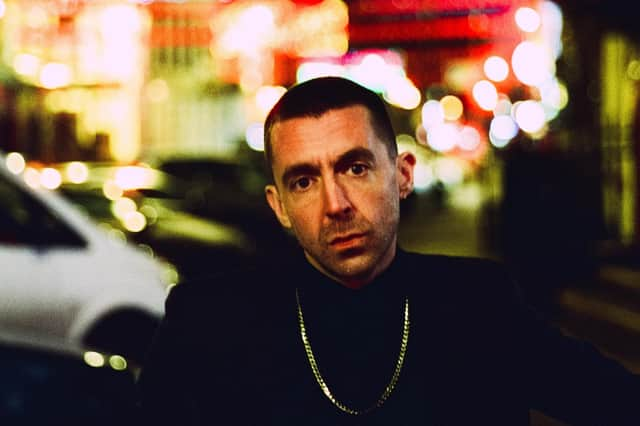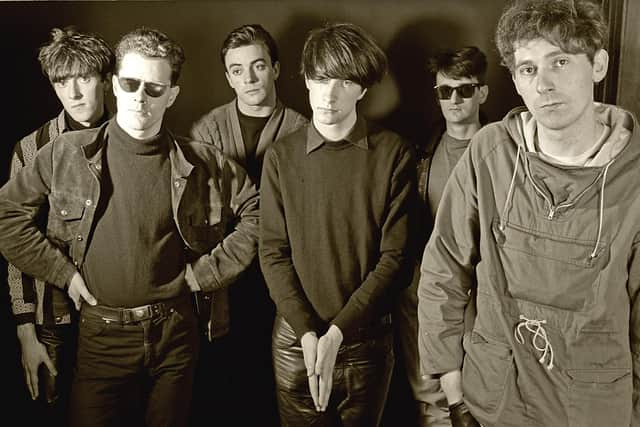Album reviews: Miles Kane | Primal Scream | Lucy Spraggan


Miles Kane: One Man Band (Modern Sky Records) ***
Primal Scream: Reverberations (Travelling In Time) (Young Tiki) ****
Lucy Spraggan: Balance (CTRL Records) **
How have the chips fallen, post-pandemic, for the stylish Mr Miles Kane? Following his 2022 Northern Soul-inspired release Change the Show, he is back in moody black-and-white indie frontman mode for One Man Band, an album which is anything but, even if the spotlight is firmly on Kane and his guitar.
Advertisement
Hide AdAdvertisement
Hide AdDrawing inspiration from The Libertines and The Strokes, this is an unapologetically indie rocking record, written with Blossoms frontman Tom Ogden and recorded back on his native Merseyside with his cousins, Coral frontman James Skelly on production duties and Ian Skelly on drums.
Kane is a natural peacocking performer but he appears to be looking for something a little less varnished on his fifth solo album. He sounds comfortable – maybe too comfortable, as the material uniformly lacks that songwriting je ne sais quoi that James Skelly brings to his own work.
Opener Troubled Son is a standard melodic indie rocker, bouncing along with driving guitar and a bit of a snarl in the vocal, while you can almost feel Kane strutting about like a psyched-up boxer on commercial garage rocker The Best Is Yet To Come. He keeps up the momentum on the title track, but adopts a softer, almost flirtatious vocal tone.


Ransom slows the pace further with its trippy guitar sound and Kane busts out some sonorous indie crooning on Scared of Love. He is clearly having fun, riffing joyfully on Doubles and unleashing the distorted guitar hook of Never Taking Me Alive which lands, like much of the album, not far from the busy indie rock of Johnny Marr or a lighter incarnation of Queens of the Stone Age.
Reverberations (Travelling In Time) captures Primal Scream in their earliest days when they were darlings of the C86 indie scene, a 12-string jingle-jangling combo who bore little resemblance to the Screamadelic outfit they became – “hard nuts playing soft sounds” as Saint Etienne’s Bob Stanley puts it in the sleeve notes.
This was Bobby Gillespie and guitarist Jim Beattie’s band, with bassist Robert “Throb” Young also in situ, alongside drummer Tam McGurk and tambourine player Martin St John, daring anyone to question their love of The Byrds and The Velvet Underground at a time when the musical trade winds were blowing in more of a blue-eyed soul direction.
The five tracks off their first two singles on Creation Records are collected here beside 11 previously unreleased tracks from various BBC Sessions – all songs which comprised their late Eighties live setlists, ranging from the carefree but throwaway Feverclaw, a song asking to get beaten up in the playground, to enduring indie classic Velocity Girl, a whole 80 seconds long in its single form but jammed out to a positively indulgent two minutes in the session version with an exultant coda from Beattie.


Advertisement
Hide AdAdvertisement
Hide AdClosing garage instrumental Spirea X is a mere minute long but a signpost to where they would head 15 years later with XTRMNTR. Reverberations is a verdant reminder for those who were there at the time and a charming primer on what Gillespie calls their ““existential blues, Glasgow style” for those who weren’t.
Lucy Spraggan is the onetime X Factor contestant who went her own way to forge a sustainable independent career. Her latest album Balance demonstrates that she was slightly ahead of the curve as a conversational, confessional mainstream pop singer/songwriter – the title track could easily be a Taylor Swift or Lewis Capaldi number. The rest of the album follows a similar pattern with heavy emotions delivered as light, catchy pop music. She pays sentimental tribute to her friend Caroline Flack on Caroline but most of the focus is on her own struggles.
CLASSICAL
What Remains: Roukens, Reich, Messiaen (Rubicon) ****
A few weeks ago, the Dudok Quartet Amsterdam were a last minute replacement act at Music at Paxton in the Scottish Borders. Most striking then was their challenging individuality, a style of programming that stretched beyond pure string quartet repertoire to embrace tasteful arrangements of earlier music, even if the performances were mixed in delivery. Turn to this summer release by the same young ensemble and the impression is more throughly convincing. The only common repertoire are the early vocal works – from 12th century Perotin to 16th century Gesualdo – recast as a quick-fire instrumental trilogy, and a welcome breather between the hypnotic post-minimalism of Joey Roukens’ String Quartet No 4 “What Remains” and the motorised pugnacity of Steve Reich’s Different Trains, the spirited live playing in the Reich fused hauntingly with the pre-recorded material originated by the Kronos Quartet. A timeless Messiaen arrangement provides the perfect conclusion. Ken Walton
FOLK
Dallahan: Speak of the Devil (Own Label) ****
Dallahan know how to make a dramatic entrance. Beaton’s, the instrumental opening their fourth album, leads off with the thrum of Ciarán Ryan’s banjo over fiddle and accordion drift from (new member) Benedict Morris and Andrew Waite before launching full-tilt into the reel over the flicker of Jack Badcock’s guitar. Drawing on European and other influences as well as Scots-Irish roots, they’ve developed steadily in cohesion as well as instrumental prowess, delivering spirited exchanges and unison flights in tracks such as Bindølfin or Durbar Square, with its sparkling, gypsy-jazz-like breaks. History and literature inform Badcock’s songwriting. He delivers Rude Spanish Soil, inspired by Laurie Lee’s writing, with passionate clarity, while Marina and The Bullet and the Blade echo the Spanish conquest of Central America. The Picture on the Wall, a setting of lines by 19th-century American poet Henry Clay Work, is a haunting meditation on loss. Jim Gilchrist